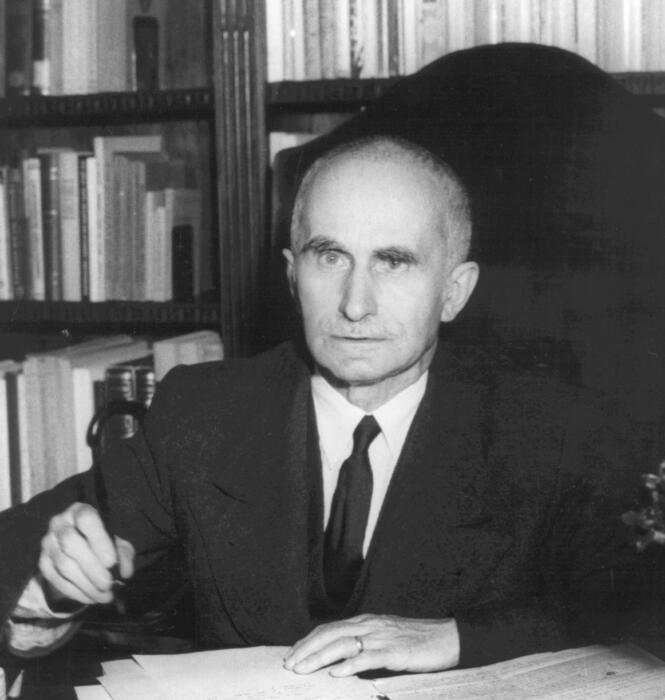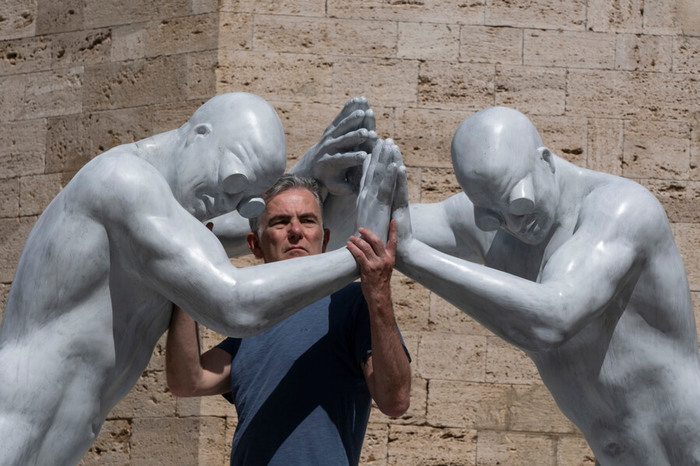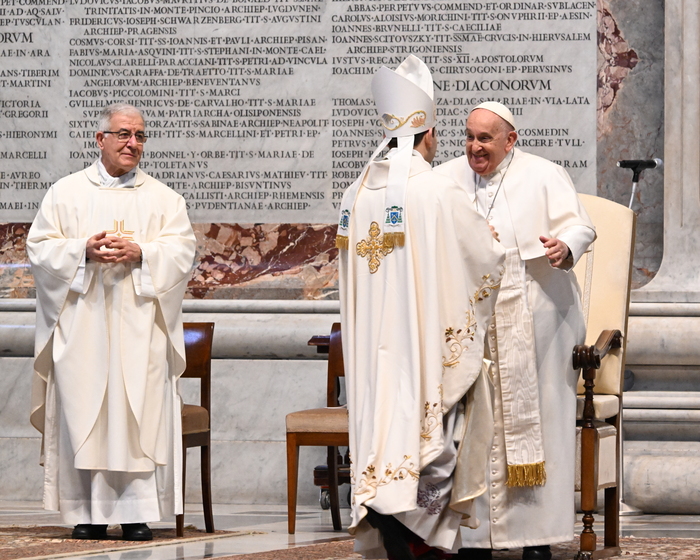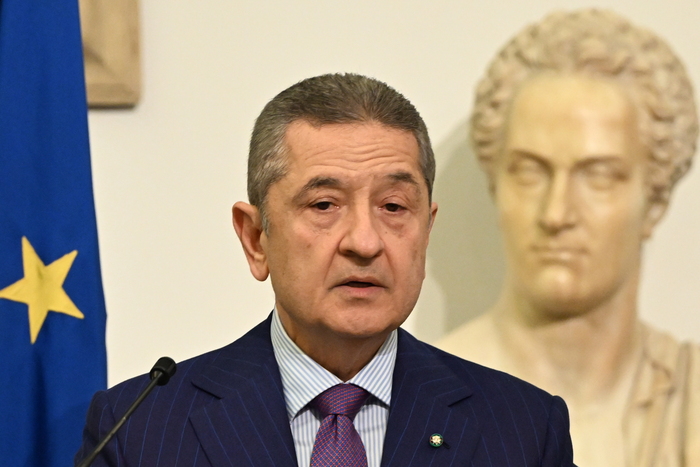The childhood sounds of Ludovico Einaudi (Turin, 66 years old) pivot between the sounds of the piano that invaded the house by his mother, Renata, and the political or literary discussions held by his grandfather Luigi, second president of the Italian Republic, or his father, Giulio, a legendary legendary editor throughout Europe.
He preferred the former.
They avoided him.
Schumann and Chopin went more with his withdrawn character than the heated diatribes of the paternal branch.
During the pandemic, the pianist and composer secluded himself in the Piedmont countryside of his childhood and has now returned to Turin as a base to stay between his tours.
For example, the one that will take him to Spain at the end of September, to perform in Mérida, Córdoba, Seville and Madrid, where he will do it the last three days of the month at the Teatro Real, with practically all the role sold.
In her,
Einaudi will play that piano that, he says, floats and flows with the sounds of his latest album, Underwater, a direct return to the essences he composed in his confinement during the pandemic.
A student of Luciano Berio, he learned both from him and from his mother, a healthy eclecticism that has led him to associate Bach and Vivaldi with the Beatles and Chopin with Philip Glass, and delve, from minimalism, into the search for sounds that in this time of distortion and erosion bring us closer to harmony and beauty.
When I meditate on his music, one word comes to mind: water.
Now that he titles his new album Underwater, it is clear that he was not so far off the mark with that idea.
Yes, I like the idea of water because it flows, as music should.
Giving my latest album that title also has to do with the feeling of being immersed.
A feeling of penetrating into yourself.
When you swim you place yourself in another dimension, your perception of the world is alien to the solid, you observe from another perspective.
Subconscious?
Yes, and this music, at least I have tried, flows and floats.
It surrounds you and evolves in another way.
I have tried not to suffer interference from an artificial sphere.
Seek purity and keep it away from contamination.
Have you managed to isolate yourself from noise dirt for that?
It is what I wanted, for it to develop naturally in its own process.
Search for form and pure emotion.
It's pure, I think.
He tells me this from idealism, and, true, since the pandemic we have sought a more direct contact with nature to breathe.
But haven't we also felt drowned?
Of course.
For many people, the pandemic has been a terrible trauma.
But in my case I have not felt that way.
And as an artist I express my feelings.
For me, it had a positive effect and it's okay to look for it and emphasize it.
I saw how some animal species became visible and the air was cleaned by the effect of that stop.
Perhaps everything would be easier if we took a step back and diminished that accelerated, deranged and somewhat absurd life that we had.
The fact of traveling without enjoying the destinations, or seeing them, what is the point?
We would save a lot of resources.
Is stopping a luxury?
Of course, it is a luxury, and we should seek a balance between the previous and what is to come.
It is a noble aspiration.
Are we not somewhat in need of them?
Of course.
We have to learn and draw conclusions.
It will not be easy and we are too many.
For starters, some leaders and leaders should stop flying to climate summits on private jets.
You have always mobilized against climate change.
He even shot a video for Greenpeace in the Arctic
— Elegy for the Arctic — which was quite an allegation.
Things never happen by chance.
I was very surprised but honored that Greenpeace invited me to participate in that action.
I began to become aware of environmentalism when I returned to those places that for me, as a child, were paradises and I saw how nature lost its drive and some species disappeared.
There are spaces where the sea has changed from blue to grey.
Not to mention the urban aberrations that destroy landscapes and even the charm of historic cities.
You become aware until you realize the general disaster.
For years I had hoped that the situation would change.
But it hasn't happened, we are getting worse: we are surrounded by plastic, the fish are dying, there is no time.
Can we find a parallel to describe what has happened in nature with music?
There was a generation of composers before yours who dedicated themselves to destroying harmony.
Have you had to go back to basics to rebuild it, even look for the melody and the beauty?
In the 1940s and 1950s there was an obsession with decadence, with a world that was falling apart.
A peak was reached in this regard.
The disaster of the Second World War had occurred, and in fact, in music, we too have fought our Second World War.
Rebuilding everything has been difficult, hard.
In many cases, in art we have had to start from scratch.
In which ones?
What you have planned does not always happen and, for example, after all that, a very important movement of popular expression was emerging in music.
He was looking for the dance, the melody, the rhythms.
In a word: he was young.
And that energy, that explosion, surpassed the mentality of classical music and of those creators who came from that tradition, even questioning it.
It was much more powerful.
And contagious.
As a teenager, I was dazzled by that world.
That revolution influenced me much more, not only musically, but also as a person.
In the way I behave, dress, wear my hair.
We were filled with a strong desire to change.
As an artist I wanted to transfer that to my world, I couldn't resist it.
Although he was also influenced by another figure who came from another space, such as Luciano Berio.
Yes, he was my teacher and I worked with him for many years.
But Berio was a very open character.
He loved the Beatles, African music, jazz… he understood perfectly where the world was heading.
The composer and pianist Ludovico Einaudi, during a performance at the Sala Pleyel in Paris in April.Julie Glassberg (Contact)
I mean, a heretic in his own world?
Yes, because those circles were full of fanatics and very dogmatic ideas.
For example, Pierre Boulez and his followers?
Yes, sure, Boulez was smart, intelligent, but opinionated and fanatical.
Berio, on the other hand, represented the opposite.
He connected with folk, pop, and in the end they dismissed him with a certain smile of contempt, of condescension.
They did not consider it as pure of the new dogma as it should be.
However, for me, and seen today, he was a fabulous artist, who knew how to connect the past and the present in an authentic way from the roots.
Perhaps the key to evolving, even revolutionizing, is staying true to a tradition rather than trying to demolish it?
In that sense, what has been most important to you?
Bach or minimalism?
Bach is always a great starting point and reference.
When he needs inspiration, spirituality, complexity, architecture, I listen to him and he doesn't fail.
And minimalism, in my case, is the key that opens up a new way of working with harmonies, melodies and rhythm.
In that sense, for me, the fundamental figure is Philip Glass.
That work that never ends, that seems to repeat itself but, instead, constantly evolves with a kind of Buddhist attitude.
He is pragmatic.
Mathematician too?
Also, in many ways.
For me, in what has been my training and influences, fundamental.
Once Philip Glass met Paul Simon.
This one began to flatter him telling him how much he revered his operas, symphonies, works for chamber, orchestra, piano... And Glass replied: “Oh, yes?
Well, I would change everything for one of your songs”.
It's good, that's good.
That sums up the importance of popular music.
The melodies of a song are immortal.
They reveal themselves to us as pure divine inspiration.
Perhaps so much so that in a hundred years, when people look at the 20th century, won't Lennon and McCartney be more important than Boulez or Stockhausen?
Of course.
They will be the classics of our time.
I actually listen to Lennon and McCartney much more than Stockhausen.
Perhaps when I go to that type of composers I do it for an intellectual duty that lasts me 10 minutes, while I could listen to the Beatles every day.
And the quality of emotion that they provide me is maximum.
It is not even necessary to plug them into a player, they are in our heads, continuously, inside us.
Absolutely.
And the baggage of musical references they use is so enormous that they are a musical encyclopedia, at every step they rehearsed new steps and trends.
Like listening to a tremendous amalgamation that goes from sacred music to Hinduism in a single song.
"In a situation where I find a lot of people around, I don't speak."
Ludovico Einaudi in Paris.Julie Glassberg (Contact)
Although to be a musician, if the Beatles represent a good reference, I imagine that the fact of being born in Italy, much more.
Yes of course.
We have talked about Bach, but not about Vivaldi or Monteverdi…
Either Verdi or Puccini.
Western music was born there… Does it weigh?
Yes, although I never thought of it that way.
I don't think about inheritances when I compose.
But there they should be...
Yes, what I don't know, in my case, is where.
Better that others analyze it than myself.
Better for you, because coming from a country where opera has been invented, musical forms that go from the concerto to the sonata or instruments like the violin and the piano…, I insist, you must make a mark.
Yes Yes.
Sometimes, the relationship with history can be very overwhelming.
That is why I must focus on it sprouting naturally.
If you think about these things too much, you lose yourself.
That has been the problem of the musicians of that generation of the fifties, who thought too much about these things.
His family heritage with his country is also powerful.
His grandfather was the second president of the Italian Republic between 1948 and 1955. What would he have said if, as could have happened this year, Berlusconi had been elected to the same post?
I wouldn't have had a good reaction.
She would roll over in the grave!
We are living crazy times in the world and in my country.
And about your parents, what can you tell me?
My father was one of the great publishers of this country.
With such an atmosphere at home, so intellectual, music was my refuge.
And that comes from my mother, her family was completely musical.
She played the piano, and my maternal grandfather, Wando Aldrovandi, succeeded as a composer and musical director.
He knew Puccini and directed some of his operas, but with fascism he emigrated to the UK, then to Australia, and couldn't come back.
He left when my mother was 12 years old, for work, but World War II broke out and he couldn't come back.
He died outside in 1952.
A sad story.
Yes, it affected her a lot.
In short, she leaves her inheritance in us.
For me, music became the way to stay in touch with emotions.
I did not identify my world with that of the economy, politics, that which was drunk in our house.
A very marked intellectual environment.
I felt in touch with myself and completely free through music.
For me it was essential that my mother gave me that facet.
She played me both Chopin and the Beatles.
Pure eclecticism.
Total.
From Schumann to Bob Dylan or the Rolling Stones, everything was included.
The songs are form, well, but also breath.
You get rid of it and go to another.
Chopin's music also has some of that, in its forms: etudes, ballads, waltzes, mazurkas.
I imagine that is another of his great influences.
Of course, also in him the music was something very organic.
He sat down, invaded him and pushed him out.
His Preludes fascinate me, they have an incredible harmonic construction.
They represented a revelation for me.
A piano in my house had a total presence.
You were next to him or in your room reading a comic.
I remember that prelude number four, in particular, exerted a kind of spell, it produced a very strong attraction in me, in a certain sense you noticed that it fed and enriched it.
A gift that challenged you.
Through him, I began to connect deeply to music and appreciate it.
I could no longer separate myself from those emotions, they kidnapped me.
That influence is noticeable in his music, particularly that of the Preludes.
Yes, number 15, which is known as the drop of water, the longest in the series, also touched me.
I guess he was a shy kid.
Yes, or, rather, quiet.
I still am.
In a situation where I find many people around, I don't speak.
I listen, but I hardly speak.
Still well.
Discreet, somewhat withdrawn.
I prefer a one-to-one relationship, and more than three makes me uncomfortable.
I speak through music, that way I think I'm more interesting.
More than through words.
Even when I read the interviews that they do to me, I think that I could have articulated the answers better.
Or, if they ask me for something written, I rewrite it over and over again.
Is your language the score and not the alphabet?
It's like that, I don't reach the same level or quality with the alphabet as with musical notes.
Let that be said by the son of a legend of the edition in Italy...
Yes, although I have a small anecdote in this regard that reassures me.
Once I had to write a note to the program of a play by Berio and it was read by Italo Calvino, who was a close friend of my father.
For me he was Uncle Italo.
And he told me: “I really enjoyed the concert yesterday, but also the note to the program that you wrote”.
That made me happy.
Especially when we talk about a writer who could spend days in a sentence.
Very obsessive.
If I had dedicated myself to writing, I would be like him.
But in music I feel much freer now, it's easier for me to compose.
Let's talk about the cinema.
Do you think that this medium has built a bridge between the avant-garde and classicism as a mode of expression?
Yes, movies represent a new world that I relate to opera.
There different modes of expression are mixed.
We are living an evolution with the series.
In both you can develop new ideas, sounds, in dialogue with the image.
They are perfect for investigating new languages and expression.
You also learn from other composers and, on top of that, you greatly increase your audience.
Subscribe to continue reading
read without limits
Keep reading
I'm already a subscriber

/cloudfront-eu-central-1.images.arcpublishing.com/prisa/7LFAWNSKD5GWHKDGMZIZSCOVLM.JPG)







